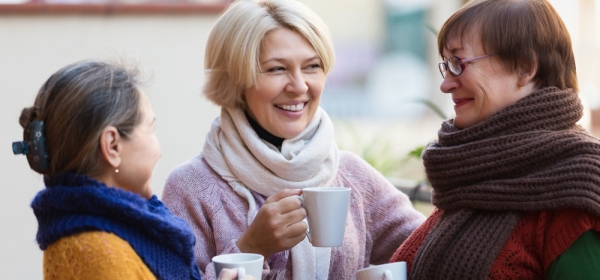How do your feelings about your body change as you grow older? That was the question posed to Facebook users by the ABC.
A comments thread on the ABC’s Facebook page, which contained responses from 87 people, posed the question “Does the voice in your head get kinder as you get older?” It turns out that as women enter midlife, many begin to view their bodies with more kindness than perhaps they did when they were younger.
These results prompted a research program on body image, headed by Susan Paxton, a Professor in the School of Psychological Science at La Trobe University and published in the Journal of Women & Ageing.
Most women will battle with body image issues at some point in their lives, commonly manifesting in eating disorders, social anxiety and self-consciousness. Many of these insecurities stem from pressure over beauty ideals promoted through media and advertising.
In the Facebook comments, 56 per cent of women said that as natural age-related changes began to occur to their bodies, their ability to accept themselves as ‘normal’ improved. Furthermore, with age came increased attention to health over beauty.
“If they gained weight or they got wrinkles, it was a normal part of ageing and they felt fine about it and it didn’t disturb their sense of selves. They were more likely to value health and wellbeing as opposed to appearance,” Professor Paxton said.
While most respondents spoke about positive changes to their body image, almost 40 per cent suggested the voice did not become any kinder with age. Many cited difficulties in learning to accept being different from the youthful bodies commonly idealised as beautiful.
Women who made these comments discussed their anxieties over becoming ‘invisible’ and not considered attractive.
“They reacted negatively to the changes in their bodies as they aged and were very much aware that in our culture, youthful bodies are idealised,” Professor Paxton said.
In addition to the positive and negative comments, the research revealed four themes: physical changes with ageing, the decreased importance of physical appearance, the importance of sociocultural influences and the invisibility of women in midlife. Professor Paxton said these findings could play a big part in helping to improve treatment for related physical and mental health problems.
While most previous research into how women perceive themselves has focused on whether or not they were satisfied with their bodies, Professor Paxton says the question of whether the voice in women’s heads becoming kinder with age refocuses the attention in a good way.
“It’s a good question because it is about acceptance and how you’re viewing your body in the general sense of yourself as a person,” she said.
Read more in the Journal of Women & Ageing
Read more at abc.net.au
Listen online at radio.abc.net.au
Opinion: How do you get good body image?
How do you develop good body image? What can we sumise by looking at the 56 per cent of women in this research who described having better body image as they grew older?
The research makes it tempting to wrap up the issue with a little bow; while many women might fret over their appearance and struggle with body image most of their lives, the silver lining is that eventually, when they’re older and wiser, most will make peace with it. So, let’s leave them to it, right?
What’s most interesting about the topic of women and body image isn’t the answer to the question of whether the self-critical inner voice fades as we age – but how it can happen for some women and not for others. The question is: what are the 56 per cent of women doing differently to the other 40 per cent?
As a young woman who has struggled with body image, I believe that as a society, we have a nasty tendency to breed insecurity into girls through the media and the way we judge women by their looks every day. Once insecurities become ingrained, it can take many years to remove them.
From an anthropological point of view, we can almost think of self-acceptance as a default in humans. Take children, for example: as babies, they develop a sense of themselves as beings. Then, as toddlers, they begin to recognise others in relation to themselves. It’s only after this, when they learn how to compare themselves, that trouble can begin. If children live in a social environment that encourages them to compare themselves to others and see what’s lacking, then self-doubt can build. Throw in some Cover Girls and Victoria’s Secret models and you’ve got a recipe for systemic insecurity.
So, how do some women (and men) come to have a better relationship with their bodies than others? The more focus you place on an issue such as this, the worse it can become. The more you value yourself (and allow others to value you) based on your looks, the less valuable you will feel. A confident person will walk into a room and look for their friends; an unconfident person walks in and wonders who’s looking at them and what they’re thinking.
Anyway, I’m no expert. That’s just what I’ve learned.
What have you learned about having a good body image? Do you struggle with body image? Do you think the positive responses from the 56 per cent and the negative responses from the 40 per cent of women are a reflection of how women in wider society feel?

